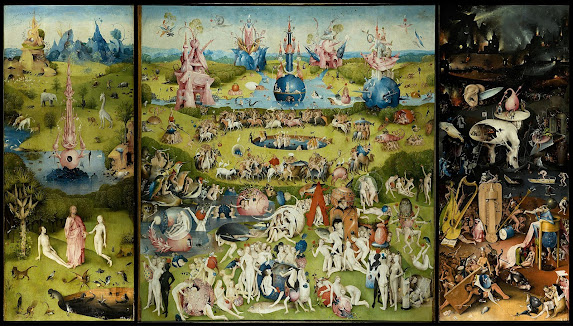Anthony Morelli Renaissance Blog
The Renaissance and The Garden of Earthly Delights
By Anthony Morelli
Little is known about Hieronymus Bosch other than that he was a Dutch painter in the late 14th and early 15th centuries, in regards to this piece specifically was first recorded in 1517. This level of mystery is definitely reflected in Bosch's art, which mostly consists of strange creatures or demons tormenting people. Without the artist to tell us what this painting represents it's up to the individual's interpretation, however, the basic message is fairly clear: On the first panel we have Adam, Eve, and God in the Garden of Eden, however, we see these demons coming into the scene from the hole in the bottom on the panel. In the next panel, we see all the naked humans interacting with these strange creatures and performing what we can assume are "earthly delights" and on the next panel, we can see the result. In the third and final panel, we can see these demons torturing the people for what they have done. This painting is clearly a warning against what happens when you partake in these "earthly delights" during the Renaissance when traditional religious ideals were being challenged. So what are these earthly delights? Most people think Bosch was referring to the seven deadly sins which we can see a few examples in the center panel. For example, all over the piece, we see people "lustfully" with each other and themselves. We also people greedily gorging on large fruits in multiple places, assumedly the forbidden fruit and we see plenty more examples of these deadly sins in every corner of this panel. In my opinion, this painting definitely leaves a strong impression and is packed full of detail in every square inch and overall is open to limitless interpretation.
References
- Dr. Sally Hickson, "Hieronymus Bosch, The Garden of Earthly Delights," in Smarthistory, August 9, 2015, accessed February 21, 2024, https://smarthistory.org/bosch-the-garden-of-earthly-delights/.
hochelaga. (2021, November 26). The disturbing paintings of Hieronymus Bosch. YouTube. https://www.youtube.com/watch?v=-n9zbPmHvJE&list=WL&index=5


.jpg)
Hi Anthony, the first thought that came to my mind, when I saw this art piece, was the "Garden of Eden" because of how the painting was presented. But as I read your presentation, I was right but with some additional as well. It's amazing how well this art piece represents how humanity has come to be with the first sin and then showing the demons and hell. I also love how Bosch used different colors in these three canvases with different meaning, going from light to dark.
ReplyDeleteThis is the first time I’ve seen this art piece and I absolutely love it ! I love how it’s almost messy but in a beautiful way. I can also see how it represents humanity . The more you look at it , you see new things each time.
ReplyDeleteI love how this painting looks- at a glance- like a Where's Waldo. Then, once you take a look at it more closely, it tells a story full of whimsy and later debauchery as you'd mentioned. I like that it leaves so much to interpretation, and it has a very pleasant color palette which pairs well with the abstractness of some of the structures within the painting. As you'd mentioned, it has chiefly Christian themes, which makes sense given the time period. I like the continuous narrative this painting provides, and more than anything else how much of a fever dream it ends up looking like. Thanks for sharing this painting!
ReplyDelete